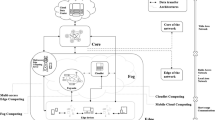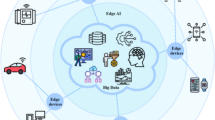Abstract
In mobile edge computing (MEC) systems, enhancing the learning capabilities of edge nodes through Artificial Intelligence (AI) can improve the efficiency of dynamically allocating resources. For the scenario of edge service migration, various tasks in lightweight IoT devices are offloaded to edge nodes and the services on edge nodes are migrated adaptively to another available node nearer to the users while they move. To speed up network application loading during service migration, this paper proposes an intelligent trace-driven predicting approach (ITPA) that improves the efficiency of I/O scheduling and the hit ratio of caching when migrating services between resource-constrained edge nodes. First, based on the characteristics of sequential access to the binary codes of an application during its startup progress, the request loading list is generated by tracing key I/O requests at that phase. Then, an intelligent algorithm is designed to search and select the key I/O requests in the loading list. Finally, the efficiency of data acquisition is improved by implementing a prefetch strategy for the client side and a three-level caching strategy for the server side. Experimental results show that the ITPA reduces the service startup time during stateless migration.













Similar content being viewed by others
Data Availability
All data generated or analysed during this study are included in this published article (and its supplementary information files).
References
Deng S, Zhao H, Fang W, Yin J, Dustdar S, Zomaya AY (2020) Edge intelligence: The confluence of edge computing and artificial intelligence. IEEE Internet of Things Journal 7(8):7457–7469. https://doi.org/10.1109/JIOT.2020.2984887
Ranjan A, Guim F, Chincholkar M, Ramchandran P, Mishra R, Ranganath S (2021) Convergence of edge services amp; edge infrastructure. In: 2021 IEEE conference on network function virtualization and software defined networks (NFV-SDN), pp 96–99. https://doi.org/10.1109/NFV-SDN53031.2021.9665021
Liang Q, Shenoy P, Irwin D (2020) Ai on the edge: Characterizing ai-based iot applications using specialized edge architectures. In: 2020 IEEE International symposium on workload characterization (IISWC), pp 145–156. https://doi.org/10.1109/IISWC50251.2020.00023
Li Y, Xu L (2019) The service computational resource management strategy based on edge-cloud collaboration. In: 2019 IEEE 10Th international conference on software engineering and service science (ICSESS), pp. 400–404. https://doi.org/10.1109/ICSESS47205.2019.9040830
Peng F, Shou G, Hu Y, Liu Y (2018) Lightweight edge computing network architecture and network performance evaluation. In: 2018 Asia communications and photonics conference (ACP), pp 1–3. https://doi.org/10.1109/ACP.2018.8596139
Zhou Z, Li X, Wang X, Liang Z, Sun G, Luo G (2020) Hardware-assisted service live migration in resource-limited edge computing systems. In: 2020 57Th ACM/IEEE design automation conference (DAC), pp 1–6. https://doi.org/10.1109/DAC18072.2020.9218677
Ma L, Yi S, Carter N, Li Q (2019) Efficient live migration of edge services leveraging container layered storage. IEEE Trans Mob Comput 18(9):2020–2033. https://doi.org/10.1109/TMC.2018.2871842
Lim E-J, Ahn S-Y, Kim Y-H, Cha G-I, Choi W (2017) Design of cache backend using remote memory for network file system. In: 2017 International conference on high performance computing simulation (HPCS), pp 864–869. https://doi.org/10.1109/HPCS.2017.131
Dai D, Bao FS, Zhou J, Chen Y (2016) Block2vec: A deep learning strategy on mining block correlations in storage systems. In: 2016 45Th international conference on parallel processing workshops (ICPPW), pp 230–239. https://doi.org/10.1109/ICPPW.2016.43
Liao J, Chen S (2016) Optimization of reading data via classified block access patterns in file systems. IEEE Access 4:9421–9427. https://doi.org/10.1109/ACCESS.2016.2642918
Ma J, Zheng X, Liu Y, Chen Z (2021) Kbp: Mining block access pattern for i/o prediction with k-truss. In: 2021 IEEE Intl conf on parallel distributed processing with applications, big data cloud computing, sustainable computing communications, social computing networking, pp 167–176. https://doi.org/10.1109/ISPA-BDCloud-SocialCom-SustainCom52081.2021.00035
Zhang Y, Guo K, Ren J, Zhou Y, Wang J, Chen J (2017) Transparent computing: a promising network computing paradigm. Computing in Science Engineering 19(1):7–20. https://doi.org/10.1109/MCSE.2017.17
Peng X, Ren J, She L, Zhang D, Li J, Zhang Y (2018) Boat: A block-streaming app execution scheme for lightweight iot devices. IEEE Internet of Things Journal 5(3):1816–1829. https://doi.org/10.1109/JIOT.2018.2812803
Zhang D, Shen R, Ren J, Zhang Y (2018) Delay-optimal proactive service framework for block-stream as a service. IEEE Wireless Communications Letters 7(4):598–601. https://doi.org/10.1109/LWC.2018.2799935
Cao K, Hu S, Shi Y, Colombo AW, Karnouskos S, Li X (2021) A survey on edge and edge-cloud computing assisted cyber-physical systems. IEEE Transactions on Industrial Informatics 17 (11):7806–7819. https://doi.org/10.1109/TII.2021.3073066
Lee M, Eom YI (2020) Transaction-aware data cluster allocation scheme for qcow2-based virtual disks. In: 2020 IEEE International conference on big data and smart computing (bigcomp), pp 385–388. https://doi.org/10.1109/BigComp48618.2020.00-45
Author information
Authors and Affiliations
Corresponding authors
Ethics declarations
Conflict of Interests
The authors have no competing interests to declare that are relevant to the content of this article.
Additional information
Publisher’s Note
Springer Nature remains neutral with regard to jurisdictional claims in published maps and institutional affiliations.
Rights and permissions
About this article
Cite this article
Meng, X., Shao, X., Masui, H. et al. Intelligent Predicting Method for Optimizing Remote Loading Efficiency in Edge Service Migration. Mobile Netw Appl 27, 2218–2231 (2022). https://doi.org/10.1007/s11036-022-02002-9
Accepted:
Published:
Issue Date:
DOI: https://doi.org/10.1007/s11036-022-02002-9




